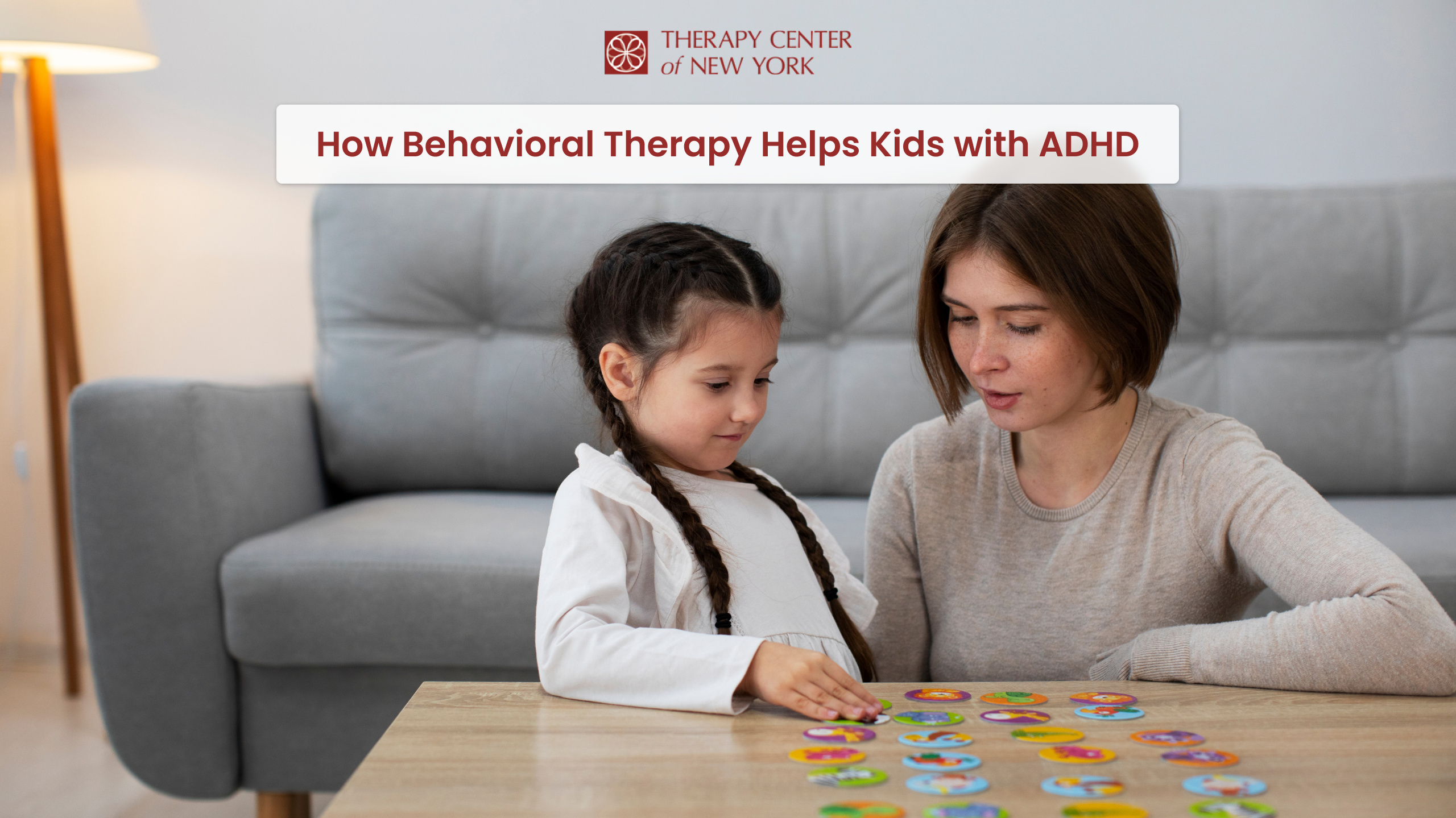How Behavioral Therapy Helps Kids with ADHD
- by The TCNY Care Team

Attention Deficit Hyperactivity Disorder (ADHD) is a commonly seen neurodevelopmental disorder that affects many children. Characterized by symptoms such as inattentiveness, hyperactivity, and impulsivity, ADHD can significantly impact a child's academic performance, social interactions, and overall well-being. One effective approach to managing ADHD in children is behavioral therapy. This article explores how behavioral therapy can help children with ADHD, providing insights into its benefits, methods, and overall effectiveness.
Understanding ADHD in Children
ADHD is a complex disorder with a variety of symptoms that can vary in intensity and presentation. The primary symptoms of ADHD include:
- Inattention: Difficulty sustaining attention, making careless mistakes, and following through on tasks.
- Hyperactivity: Excessive fidgeting, restlessness, and difficulty staying seated.
- Impulsivity: Hasty actions, difficulty waiting for turns, and interruptions in conversations.
These symptoms can interfere with a child's ability to function effectively in school, at home, and in social settings. Proper diagnosis often involves a comprehensive childhood ADHD assessment, which includes gathering information from parents, teachers, and sometimes the child themselves.
What is Behavioral Therapy?
Behavioral therapy is a structured, goal-oriented treatment that focuses on changing specific behaviors. For children with ADHD, this type of therapy helps to manage symptoms by reinforcing positive behaviors and reducing unwanted behaviors. The therapy typically involves the following components:
- Behavior Modification: This involves identifying specific behaviors that need to be changed and implementing strategies to encourage desirable behaviors and discourage undesirable ones. For example, a child might be rewarded for completing tasks on time or following instructions.
- Skill Training: Behavioral therapy often includes teaching children skills such as organization, time management, and problem-solving. These skills can help children with ADHD manage their daily responsibilities more effectively.
- Parent Training: Parents are often involved in behavioral therapy to learn techniques that can help support their child's behavior management at home. This might include strategies for setting consistent rules, providing appropriate rewards, and handling behavioral issues effectively.
- Social Skills Training: Children with ADHD often struggle with social interactions. Behavioral therapy can include training to help improve social skills, such as taking turns, listening to others, and understanding social cues.
The Benefits of Behavioral Therapy for ADHD
Behavioral therapy offers several benefits for children with ADHD, making it an effective component of a comprehensive treatment plan:
- Structured Approach: Behavioral therapy provides a structured environment where children learn clear expectations and consequences. This structure can help children with ADHD develop better self-control and improve their ability to follow rules.
- Enhanced Self-Esteem: By focusing on positive reinforcement and skill development, behavioral therapy can boost a child's self-esteem. As children experience success and recognition for their efforts, they are more likely to stay motivated and engaged.
- Improved Academic Performance: With better organizational skills and behavior management, children with ADHD can improve their academic performance. Behavioral therapy helps them develop strategies for staying focused, completing assignments, and managing classroom behavior.
- Better Social Relationships: Social skills training within behavioral therapy can lead to improved interactions with peers. Children learn how to navigate social situations more effectively, which can enhance their relationships and reduce social difficulties.
- Parent-Child Relationship Improvement: Behavioral therapy often involves parent training, which helps improve the parent-child relationship. By learning effective strategies for managing behavior, parents can create a more supportive and harmonious home environment.
Effective Techniques in ADHD Behavior Therapy
Several techniques are commonly used in ADHD behavior therapy to achieve positive outcomes:
- Token Economy: This system involves earning tokens or points for displaying desired behaviors. Tokens can be exchanged for rewards, motivating children to follow through on tasks and responsibilities.
- Behavioral Contracts: A written agreement between the child and therapist or parents outlines specific goals and rewards. This contract helps set clear expectations and provides a tangible way to track progress.
- Self-Monitoring: Children are taught to monitor their own behavior and progress. This technique helps them develop self-awareness and take responsibility for their actions.
- Role-Playing: This technique is used to practice social skills and problem-solving. Role-playing helps children understand and navigate different social scenarios, improving their ability to interact with others.
- Positive Reinforcement: Recognizing and rewarding positive behaviors encourages children to repeat those behaviors. This reinforcement can be verbal praise, tangible rewards, or special privileges.
Incorporating Behavioral Therapy into a Comprehensive Treatment Plan
Behavioral therapy is often used in combination with other treatments for ADHD, such as medication and educational support. A comprehensive treatment plan might include:
- Medication: Stimulants and non-stimulants can help manage ADHD symptoms. Medication is often combined with behavioral therapy to address both the biological and behavioral aspects of the disorder.
- Educational Interventions: Specialized educational plans and accommodations can support children with ADHD in the classroom. This might include individualized instruction, extended time for assignments, and organizational support.
- Family Therapy: Family therapy can address dynamics within the family that may impact the child's behavior and overall functioning. It also provides support for parents and siblings.
Further Resources
- Child Mind Institute: Offers in-depth information on behavioral treatments for ADHD, including strategies for parents and children.
- CDC: Provides guidance on prioritizing behavioral therapy for young children with ADHD, emphasizing its importance in early intervention.
- HealthyChildren.org: Offers practical advice on behavior therapy techniques for parents, covering setting rules, discipline, and encouraging positive behavior.
Comprehensive ADHD Support at the Therapy Center of New York
Behavioral therapy is a valuable tool for managing ADHD in children, offering structured, evidence-based strategies to improve behavior, academic performance, and social interactions. By focusing on positive reinforcement, skill development, and parent involvement, behavioral therapy helps children with ADHD build essential skills and enhance their quality of life. For families seeking support and guidance, the Therapy Center of New York provides comprehensive counseling services, including behavioral therapy for ADHD. Their team of experienced professionals is dedicated to helping children and families navigate the challenges of ADHD and achieve their full potential.
